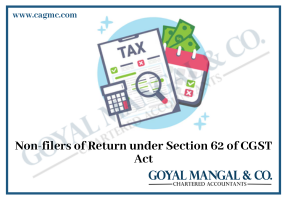
In India, the implementation of the Goods and Services Tax (GST) has had a significant impact on numerous industries, including the solar and renewable energy sector. The introduction of the Goods and Services Tax (GST), which aimed to simplify the tax structure and foster a unified market, has brought about significant changes in the dynamics of this vital industry. In this article, we will provide an overview of the impact of the Goods and Services Tax (GST) on solar and renewable energy, highlighting key areas such as pricing, investment, benefits, GST rates, and the sector’s overall growth trajectory.
|
Table of Contents |
What is GST?
GST, or Goods and Services Tax, is an indirect tax levied in India on the sale of goods and services. It is a unified tax system that has replaced several indirect taxes levied by the federal and state governments. The Goods and Services Tax (GST) was introduced on July 1, 2017. GST is a significant tax reform that has had a transformative impact on the Indian tax system, aiming to streamline taxation, reduce complexities, and promote a more efficient and transparent tax regime.
What is Solar energy?
Solar energy specifically refers to the energy derived from sunlight through technologies like solar panels or photovoltaic cells. It is a renewable source of energy that is abundantly available and environmentally friendly. Under GST, solar energy is treated as a specific subset within the renewable energy category and is subject to specific tax rates and regulations.
What is Renewable energy?
Renewable energy, on the other hand, encompasses a wider range of sources, including solar, wind, hydro, biomass, and geothermal energy. These sources are considered renewable as they are naturally replenished and have a minimal impact on the environment. GST recognizes and provides provisions for all forms of renewable energy, including solar energy, by establishing tax rates, input tax credits, and compliance requirements to support the growth and adoption of clean energy sources.
Benefits of Solar & Renewable energy
Solar and renewable energy have several benefits such as:
- Reduced electricity costs: The electrical issue can be resolved, and electricity costs can be reduced by switching to solar energy.
- Inexhaustible source of energy: Solar energy is an endless supply of power and the most suitable replacement for conventional energy sources.
- Reduced usage of fuel and dung cakes: Rural homes can use solar energy to use less firewood and dung cakes.
- Better health: Using renewable energy improves health by lowering air pollution and respiratory disorders.
- Sustainable growth: The solar energy sector in India has over the years emerged as a significant player in the grid connected power generation capacity, supporting the government’s agenda of sustainable growth. Renewable energy uses less and inexpensive materials than other forms of energy and is cheaper in the long run.
- Energy independence: Solar energy can give energy independence at a relatively lower cost and help rural and urban communities solve their power issues.
- Reduced carbon footprint: Solar and renewable energy sources help make the world a greener and cleaner place.
- Job creation: India’s renewable energy sector has experienced the fastest growth, generated employment possibilities and luring foreign investment.
- Policy support: The government has introduced several programs to promote the nation’s use of solar energy, including the Solar Park Program, VGF Programs, CPSU Program, and Défense Program.
In conclusion, solar and renewable energy have several advantages, including enhanced health and sustainable development. The government has launched many programs and allocated cash to increase the production of solar modules as part of its efforts to promote the use of renewable energy.
GST on Solar power-based devices and systems
In India, the solar power business is expanding quickly. Thus, the government wants to encourage the development of innovative solar projects in a sustainable manner. The Indian Ministry of New and Renewable Energy wants to promote solar energy and promote sustainable growth of solar projects.
All renewable energy equipment is subject to a 12% GST levy, that is GST rate for renewable energy devices are generally 12% However, the project will fall under “Works Contract Services” if it also involves the installation, acquisition, and commissioning of a solar power system. In this instance, GST will be applied at a rate of 12% on 70% of the total contract value and 18% on the remaining 30%. As a result, we may state that the tax incidence on goods is 12% and that on services is 18%.
The GST Rate applicable of some solar energy products are:
- Solar controller: It measures the effectiveness of the overall setup and establishes the battery life. It is not a solar-powered appliance. Therefore, it will be taxed at 18% under HSN 8504, which is defined as “Electrical transformers, static converters, and inductors.”
- Solar structure: They are not solar power-based or solar power-based devices, according to the solar structure. Solar structures are therefore subject to GST at 18%.
- Solar panels: They are series-connected structures comprised of solar cells. They are constructed from a semiconductor material, which transforms solar radiation into electrical energy. They are therefore regarded as solar power-based equipment and subject to 12% GST.
- Solar water heater and system: Solar water heater and system will be taxed at a rate of 5%
- Solar power generating system: Solar power generating system will be taxed at 12% GST.
- Solar inverter: Solar inverter will be taxed at 12% GST
- Solar lantern/solar lamp: It will be taxed at 12% GST
- Solar power-based devices: Solar power-based devices will be taxed at 12% GST.
- Solar roof top: GST on solar roof top is 12%.
Impact of GST on Solar & Renewable energy
The following points can be used to outline the GST impact on solar power sector GST’s adoption has affected solar power and other renewable energy sources in a following way:
- Simplified Tax structure: The GST streamlined the tax structure for the solar and renewable energy
- sectors by replacing various indirect taxes with a single tax system. As a result, compliance processes are now simpler and more efficient.
- Reduced Tax Rates: As a result of GST, solar energy equipment and components now have lower tax rates, making them more accessible to both individuals and companies. The demand for and uptake of solar energy systems and other renewable energy installations have been boosted by the tax rate drop.
- ITC: GST enables companies working on solar and renewable energy projects to obtain input tax credits for taxes paid on inputs including machinery, equipment, and services. This enhances the financial sustainability of renewable energy installations and lowers project costs overall.
- Boost to domestic manufacturing: The GST’s reduced tax rates have boosted local production of solar and renewable energy equipment. As a result, there have been more investments made in domestic manufacturing facilities, more jobs have been created, and there is less reliance on imports.
- Unified market: By removing interstate barriers and harmonizing tax laws, GST has established a single market throughout India. This has made it easier for solar and renewable energy enterprises to operate smoothly and efficiently across state lines by facilitating the flow of their products and services.
- Enhanced transparency and compliance: The GST have improved compliance standards and transparency in the solar and renewable energy industries. As a result, there is less ambiguity and firms are treated equally thanks to the explicit tax rates and reporting standards that have been established.
- Growth and Investment: The introduction of the GST has improved the environment for solar and renewable energy project investment. Greater investments have been attracted due to the streamlined tax structure, lower tax rates, and enhanced compliance procedures, which has aided in the expansion of the solar and renewable energy sectors.
- Transitional challenges: Businesses had to overcome obstacles and make adaptations during the initial phase of the transition to the new tax system. This may have caused temporary disruptions in project execution, supply chains, and financial planning.
The implementation of the GST has generally had a favourable effect on solar and renewable energy, as seen by the simpler tax structure, lower tax rates, availability of input tax credits, encouragement of domestic manufacture, and increased transparency. Even though there were difficulties during the transition period, the solar and renewable energy sectors’ long-term prospects under the GST framework are still positive. Diagrammatic representation of impact of GST on Solar & Renewable energy is depicted below.

Takeaway
In conclusion, the GST has had a significant positive impact on the solar energy and renewable energy sectors. The reduction in tax rates, availability of input tax credit, and streamlined compliance procedures have made solar energy equipment and components more affordable and accessible. This has stimulated the demand for solar energy systems and renewable energy installations, supporting the growth of the industry. GST has also encouraged domestic manufacturing, leading to job creation and reduced dependence on imports. While there were challenges during the transition period, the long-term prospects for the solar energy and renewable energy sectors under the GST framework are promising. The renewable energy sector is projected to expand with GST support and refining, contributing to a cleaner and more sustainable India.







